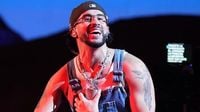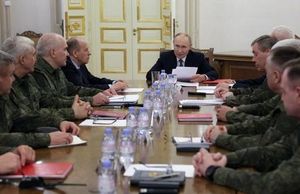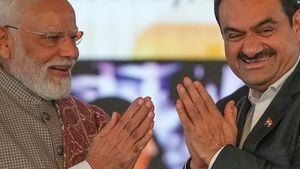The NFL world is no stranger to controversy, but the debate swirling around the Super Bowl LX halftime show has reached a fever pitch, thanks to the selection of Puerto Rican superstar Bad Bunny as the headline performer. With the big game set for February 8, 2026, at Levi’s Stadium in Santa Clara, California, the spotlight has shifted from the field to the stage—and not everyone is cheering.
Hall of Fame running back Eric Dickerson has become the most vocal critic of the NFL’s decision. Speaking candidly to TMZ photographers at Los Angeles International Airport on October 8, 2025, Dickerson didn’t mince words about Bad Bunny’s inclusion. “I’m from the US. I love my country. And if you don’t like the United States, just get your ass out of here and don’t come over here,” Dickerson declared, his passion for his homeland clear as day. It’s not every day that a football legend takes such a public stance, but Dickerson doubled down, urging Bad Bunny to “keep his ass” away from the Super Bowl if he truly doesn’t like the country.
When reminded that Puerto Rico is, in fact, a U.S. territory and that Bad Bunny is an American citizen, Dickerson didn’t budge. “I know Puerto Rico is part of the US. But, it’s not the US. That’s the way I look at it. That’s the way I feel,” he insisted. It’s a sentiment that’s sparked fierce debate across the sports and entertainment landscapes, with fans and commentators weighing in on both sides of the aisle.
The roots of this controversy stretch back to Bad Bunny’s recent career choices. For his “Debí Tirar Más Fotos” world tour, the reggaeton artist notably skipped U.S. cities, choosing instead to perform exclusively in Puerto Rico. Reports suggested that his decision was influenced by concerns involving Immigration and Customs Enforcement (ICE) and the safety of his fans, many of whom reside in the United States. This move, combined with Bad Bunny’s outspoken political positions—particularly his criticism of former President Donald Trump—has only fueled the fire.
Indeed, Dickerson is far from alone in his criticism. Former President Trump himself has called the NFL’s choice “crazy,” telling Newsmax, “I never heard of him, I don’t know who he is, I don’t know why they’re doing it. It’s like, crazy.” Trump went on to claim that NFL Commissioner Roger Goodell was shifting blame for the decision to a hired promoter, adding, “I think it’s absolutely ridiculous.” Other Republican figures and MAGA commentators have echoed similar sentiments, raising concerns about Bad Bunny’s suitability for the Super Bowl’s massive, predominantly English-speaking audience.
Bad Bunny, whose real name is Benito Antonio Martínez Ocasio, is no stranger to the Super Bowl stage. He previously appeared during Jennifer Lopez and Shakira’s memorable halftime show at Super Bowl LIV in 2020. This time, however, he’s front and center, following up Kendrick Lamar’s iconic 2025 performance. The 2026 show will be broadcast nationally on NBC and streamed on Peacock, ensuring that millions will be watching—whether they’re fans of Bad Bunny or not.
The artist’s response to the criticism has been as bold as his music. Hosting the season premiere of “Saturday Night Live” on October 4, 2025, Bad Bunny addressed his detractors head-on. “You might not know this but I’m doing the Super Bowl halftime show and I’m very happy and I think everyone is happy about it—even Fox News,” he joked. In a clever segment, he played a heavily edited clip of Fox News anchors and pundits praising him, before switching to Spanish for several seconds. He closed with a challenge: “If you did not understand what I just said... you have four months to learn!” It was a mic-drop moment that made headlines and only intensified the conversation.
Despite the uproar, Bad Bunny’s star continues to rise. He was recently named No. 1 on Billboard’s Top Latin Artists of the 21st Century Chart and remains a cultural force on the global stage. His “Debí Tirar Más Fotos” tour is set to continue after the Super Bowl, concluding with a European leg that wraps up in Brussels, Belgium, on July 22, 2026. This upcoming halftime performance will also mark his first show in the United States since May 2024, when his “Most Wanted Tour” wrapped up in Nashville.
But the debate is about more than just music. For many, including Dickerson, it’s a matter of patriotism and respect. “If Bad Bunny said something about the US, don’t come here and perform,” Dickerson reiterated. “You know, don’t come here. Stay in your country.” The football legend’s remarks have drawn both support and criticism, highlighting the deep divisions that can arise when sports, politics, and pop culture collide.
Yet, some observers argue that the controversy is as much about changing American demographics and tastes as it is about politics. The NFL has long sought to broaden its appeal and reflect the diversity of its fanbase. By choosing a global superstar like Bad Bunny—whose songs are primarily in Spanish—the league may be signaling a shift toward greater inclusivity, even if it means ruffling a few feathers along the way.
Of course, not all fans are convinced. Detractors argue that the Super Bowl’s audience won’t connect with a halftime show performed largely in Spanish, and some question whether the artist’s political views should factor into his selection. Others, however, see the move as a celebration of Latin music’s growing influence and a powerful statement about the NFL’s place in a multicultural America.
As the countdown to Super Bowl LX continues, one thing is certain: the debate isn’t going away anytime soon. Whether Bad Bunny’s performance will silence his critics or further ignite the flames of controversy remains to be seen. For now, the spotlight is firmly fixed on Levi’s Stadium, where sports, music, and national identity will all take center stage on February 8, 2026.
One can only wonder—will the halftime show be remembered for its music, its message, or the storm of opinions swirling around it? Fans and critics alike will have to tune in to find out.

![“Keep His A$$ In Puerto Rico”: NFL Legend Eric Dickerson Unloads On Bad Bunny In Explosive Rant [VIDEO] - NewsBreak](https://thumbor.evrimagaci.org/3qbuNmw8whLA7LJ48SVjFJTz9GE=/200x0/tpg%2Fsources%2Fd036bce5-ac8f-446c-9973-03a9751546b3.jpeg)




